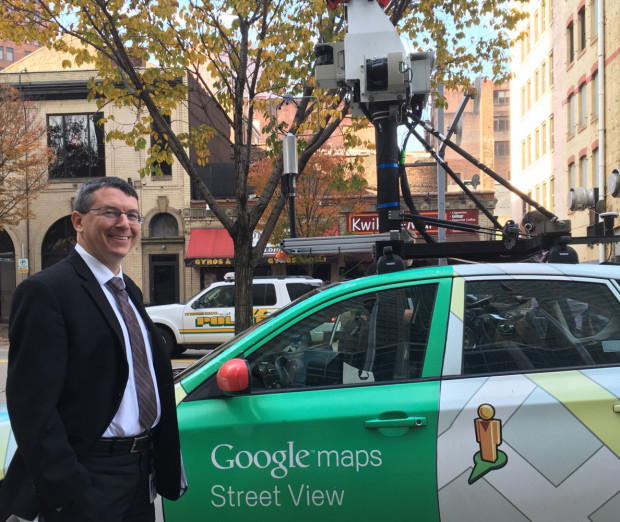Google Street View cars to seek methane leaks in Pittsburgh
-
Jon Hurdle

Courtesy: PA DEP
Acting DEP Secretary Patrick McDonnell next to one of the Google Street View cars that will be fitted with sensors to detect gas leaks in Pittsburgh. PA DEP
Leaking methane from natural gas pipes in Pittsburgh will be detected by sensors attached to Google’s Street View cars under an agreement announced on Tuesday.
The tech giant will be working with Carnegie Mellon University, the Environmental Defense Fund, the People’s Natural Gas utility, and the office of Governor Tom Wolf to develop a map of methane leaks in the city, officials said.
The program is the first in Pennsylvania and follows others in 10 other U.S. cities.
“The results of this effort will help the utility and its regulators to efficiently target the largest repair needs to prevent further leaks,” Wolf said in a statement.
According to EDF, cars with air sensors took readings in Pittsburgh between June and November this year, and found leaks of natural gas, which is mostly methane, at an average of one for every two miles within a study area.
That compares with one leak for every 200 miles in Indianapolis, one of the other cities in the program, where gas pipes are generally younger than in older cities like Pittsburgh. About 46 percent of pipes managed by People’s Natural Gas are more than 50 years old, and about 29 percent are made of materials that are more susceptible to leaks than newer materials, EDF said.
The process of detection and repair is costly and time-consuming in older cities like Pittsburgh and Philadelphia that have hundreds of miles of older piping, and the additional detection offered by the new program will likely help utilities fix the problem, said Rob Altenburg, director of the Energy Program at the environmental group PennFuture.
“There are a significant number of leaks coming out of our gas distribution system right now,” Altenburg said.
Finding the leaks will help public safety by reducing the risk of an explosion; cut down on the amount of gas that’s wasted, and reduce emissions of an especially potent greenhouse gas, Altenburg said.
“If you catch one situation before you have a public safety issue then that’s a huge benefit,” he said.
In January, Wolf launched a effort to cut methane leaks from natural gas wells, compressor stations and processing facilities in the Marcellus Shale by requiring operators to take leak-detection and repair measures, and make more frequent use of leak-detecting technologies.
The latest initiative will add to the earlier measures, said Patrick McDonnell, Acting Secretary at the Pennsylvania Department of Environmental Protection.
“Curbing methane leaks keeps more natural gas in the pipelines where it goes to homes and businesses,” McDonnell said.
















